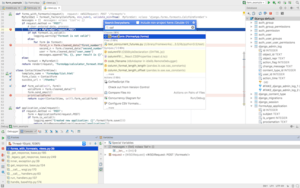PyCharm
 | |
|
PyCharm 2016.3 | |
| Developer(s) | JetBrains |
|---|---|
| Initial release | July 2010 |
| Stable release |
2016.2.3
/ September 7, 2016 |
| Written in | Java, Python |
| Operating system | Windows, macOS, Linux |
| Size | 174~270 MB |
| Type | Integrated development environment |
| License | Freemium |
| Website |
jetbrains |
| Developer(s) | JetBrains |
|---|---|
| Initial release | July 2010 |
| Stable release |
Version: 3.0.1
/ 20 October 2016[1] |
| Written in | Java, Python |
| Operating system | Windows, macOS, Linux |
| Size | 150~176 MB |
| Type | Integrated development environment |
| License | Apache License |
| Website |
jetbrains |
PyCharm is an Integrated Development Environment (IDE) used in computer programming, specifically for the Python language. It is developed by the Czech company JetBrains.[2] It provides code analysis, a graphical debugger, an integrated unit tester, integration with version control systems (VCSes), and supports web development with Django.
PyCharm is cross-platform, with Windows, Mac OS X and Linux versions. The Community Edition is released under the Apache License,[3] and there is also Professional Edition released under a proprietary license - this has extra features.
Features
- Coding Assistance and Analysis, with code completion, syntax and error highlighting, linter integration, and quick fixes
- Project and Code Navigation: specialized project views, file structure views and quick jumping between files, classes, methods and usages
- Python Refactoring: including rename, extract method, introduce variable, introduce constant, pull up, push down and others
- Support for web frameworks: Django, web2py and Flask
- Integrated Python Debugger
- Integrated Unit Testing, with line-by-line coverage
- Google App Engine Python Development
- Version Control Integration: unified user interface for Mercurial, Git, Subversion, Perforce and CVS with changelists and merge
It competes mainly with a number of other Python-oriented IDEs, including Eclipse's PyDev, the more broadly focused Komodo IDE.
History
The beta version was released in July 2010, with the 1.0 arriving 3 months later. Version 2.0 was released on 13 December 2011, version 3.0 on 24 September 2013, and version 4.0 on November 19, 2014.[4]
PyCharm Community Edition, the open source version of PyCharm, became available on 22 October 2013.[3]
Licensing
- PyCharm Professional Edition has several license options, which differ in their features,[5] price, and terms of use.[6]
- PyCharm Professional Edition is free for open source projects and for some educational uses.[6]
- An Academic license is discounted or free.[7][8]
- PyCharm Community Edition is distributed under Apache 2 license, with full source code available on GitHub.[9]
See also
References
- ↑ "Download PyCharm Edu", Jetbrains.com
- ↑ "JetBrains Strikes Python Developers with PyCharm 1.0 IDE". eWeek.
- 1 2 "Python 3.0 Community Edition source code now available" Oct 22 2013, Dmitry Jemerov, JetBrains blog
- ↑ Filippov, Dmitry (November 19, 2014). "Announcing General Availability of PyCharm 4". PyCharm Blog. Retrieved 24 February 2015.
- ↑ "Features", JetBrains.com
- 1 2 License Comparison, JetBrains.com
- ↑ "JetBrains Toolbox Subscription", JetBrains.com
- ↑ "JetBrains Makes its Products Free for Students", September 23, 2014, Robert Demmer, JetBrains blog
- ↑ "JetBrains/intellij-community". Retrieved 20 September 2016.
